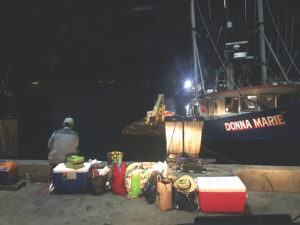England vs. Argentina (2012). South Korea vs. Japan (2019). These matchups read like a history of World Cup competitions, but in fact they were clashes where countries have gone to the brink of war over squid. It is no surprise that we, too, fight over squid and have been doing it at MacMillan Wharf for years. We are losing, all of us — even the nonsquidders.
The fallout from these battles is that the rules for squidding (and fishing) on the wharf have been changed dramatically, for the worse. Gone are the days of grandmas, kids, and everyone in-between having fun and catching squid at all hours.
Squidding is now limited to one tight spot — maybe 10 percent of what it was — near the harbormaster’s office. There is an enforced hard stop at 11 p.m., which just happens to be prime time for snagging the nocturnal squid.

The issue is complex. For starters, squid are not fish, so they are not governed by the rules for fishing, such as required permits or limits. Knowing this fact helped me one night when an environmental enforcement cop showed up.
“Can I see your fishing license, please, sir?”
“I’m not fishing…”
“Yeah, you are. I saw you reel one in.”
“Those are squid. They are invertebrates, not fish.”
He walked away.
The current squid war at MacMillan started over a decade ago with a sudden influx of off-Cape squidders. Like many before them dating back to before the Pilgrims, they were drawn to the bounty of our waters.
And there was something determined about them. They worked in an organized group under a well-dressed boss who collected the haul from his team, then put the squid in coolers in the back of his S.U.V.
They gathered massive quantities every night when the squid were in — more than any family could eat in a year. The Cape Cod Times reported that one group was nabbed with over 250 pounds one night. There are no limits, so officially they were not doing anything wrong.
Their real sin was being inconsiderate. These people were oblivious to the etiquette of squidding.
The squid rush was on and no one and nothing was safe from it. The newcomers trampled the regulars and sullied the pier. They climbed onto boats they did not own and stained them with squid ink; the same with the trucks of working fishermen parked near the squidding hot spots.
Many people experienced such flagrant fouls as the casting of lines directly over our own. A grandmotherly local told of losing her favorite squid jig when a tangle ensued; the guy cut her line without even trying to salvage it.
Another retirement-age summer squidder, up from Connecticut, told me, “They get right between you and your wife.” Indeed, they frequently dashed to and fro, casting where the squid swam by, undeterred by the presence of people already there in that exact spot. And of course, they cast over them, too.

I have long wondered if it was worth noting these squidders were Asian: Cambodian, Chinese, Vietnamese, Laotian, and Korean, by my assessment. They were mostly recent immigrants, judging from their poor English skills.
Was xenophobia at play when the guy next to me reached into his pocket to show me his handgun? Whatever moved him to bring heat to the pier, that’s when I knew things had gotten out of control.
The harbormaster acted to calm the storm with new rules. And it has worked, sort of.
“We finally got the crowds under control,” an assistant harbormaster told me last summer. But with crowd control has come a loss of something more than a pastime. It’s a loss of our very history and culture. Fishing is a major reason Provincetown was founded. Today’s limits on that activity are the most severe in the 399 years since the Pilgrims arrived.
Hell, even the bars stay open later than the pier now. Whatever the nuisance these visitors wrought, could this be what we really want? First we closed the high school. Now we are losing the culture of fishing from our pier. What is next?
I suggest that in recognition of the 400th anniversary of the Mayflower’s arrival the pier managers reconsider these new rules. Fishing from the pier is as inviolable a right as those protected by the First Amendment, assuming we are doing no harm to other people or property.
We need to find a way to manage the people who are causing problems and teach them how squidding ought to be. After all, there are plenty of squid in the sea. But there is only one Provincetown, and these regulations are gutting its spirit.
